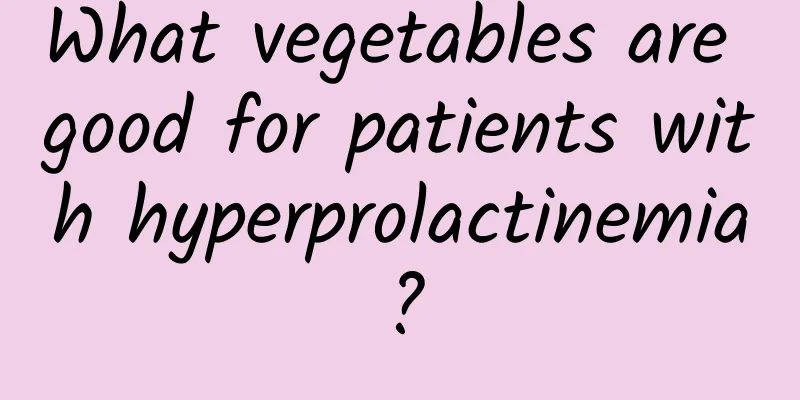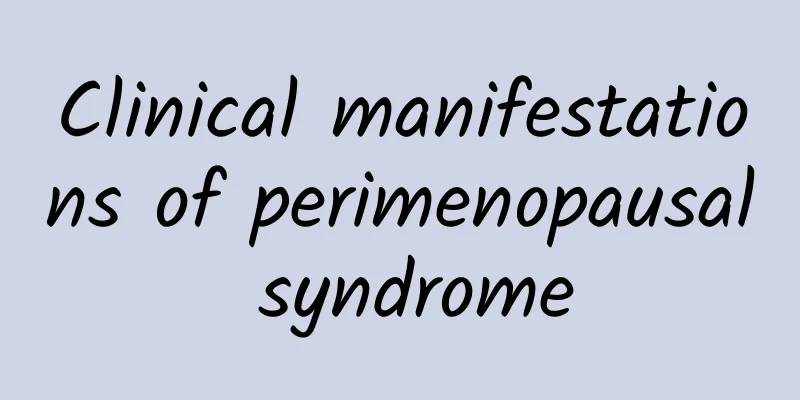What vegetables are good for patients with hyperprolactinemia?

|
Friends with hyperprolactinemia must pay attention to their diet in order to recover better. Especially before surgery, special attention should be paid to the diet. So, what vegetables are good for patients with hyperprolactinemia? Next, let's take a look at what vegetables are good for patients with hyperprolactinemia. 1. You can eat more foods like seahorses, crabs, oysters, kelp and agar-agar, etc. 2. Eat more foods that enhance immunity, such as asparagus, dates, onions, pumpkin, leeks and coix seeds, etc. 3. Avoid hot, spicy and irritating foods. If the food is hot and dry in nature, it will easily generate heat and fire after eating, making the symptoms more serious. 4. Avoid hot and greasy foods. 5. Avoid eating foods that may cause irritation, such as dog meat, mutton, and crabs. Hyperprolactinemia diet therapy Peach kernel and cuttlefish soup: remove the internal organs of a cuttlefish, add 6 grams of peach kernels and 400 ml of water and cook until the fish is cooked. Eat the fish and drink the soup, once a day. Function: promote blood circulation and remove blood stasis. Indications: Hyperprolactinemia of blood stasis type; symptoms include menstrual disorders, or early menstruation, or menorrhagia, or continuous metrorrhagia, or amenorrhea, infertility, galactorrhea, chest and flank distension and pain, irritability, premenstrual breast or lower abdominal pain that refuses to be pressed, back pain, dark red menstrual blood, and many blood clots. Motherwort and black beans decoction: 30g of motherwort and 60g of black beans are decocted in 500ml of water to extract juice, and then brown sugar and rice wine are added. Take twice a day. Function: promoting qi and activating blood circulation. Indications: hyperprolactinemia of qi stagnation and blood stasis type; symptoms include menstrual disorders, or early menstruation, or menorrhagia, or continuous metrorrhagia, or amenorrhea, infertility, galactorrhea, chest and flank distension and pain, irritability, premenstrual breast or lower abdominal pain that refuses to be pressed, back pain, dark red menstrual blood, and many blood clots. |
<<: Hyperprolactinemia treatment method
>>: Dietary considerations before surgery for hyperprolactinemia
Recommend
The causes of acute cervicitis are often the following
Cervicitis is divided into acute cervicitis and c...
shock! Korean actress Lee Ha-nui diets for 15 days to lose weight
[Key Points]: Korean actress Lee Ha-nui said whil...
What happens to bacterial vaginosis (BV)?
What happens to bacterial vaginosis (BV)? BV is t...
Expert analysis: What are the causes of uterine fibroids?
Expert analysis: What are the causes of uterine f...
What are the methods of abortion?
For unexpected pregnancies, most people will choo...
How much does it cost to cure functional uterine bleeding?
Dysfunctional uterine bleeding is a common diseas...
Satisfy your calcium and vitamin D supplement needs at once! Homemade zero fat cream soup low calorie delicious
This rich, creamy, fat-free soup uses skim milk i...
Knowing more about the classification of cervical erosion can help you better judge the condition
For a long time, cervical erosion has always trou...
What are the obvious symptoms of vulvar leukoplakia?
Vulvar leukoplakia is a common gynecological dise...
Are there any side effects of medication for cervical erosion? Dietary considerations for patients with cervical erosion
Unhygienic sexual life, miscarriage and mechanica...
Does endometrial thickness affect pregnancy?
Most of the reasons are excessive estrogen stimul...
What are the good methods for nursing patients with endometrial tuberculosis?
Although endometrial tuberculosis is divided into...
What should you pay attention to if you have cervicitis? Introduction to pathological examination methods for female cervicitis
Many women of childbearing age know that cervicit...
What causes irregular menstruation in women? 4 major habits that cause irregular menstruation in women
Menstruation is a good friend of women. When it i...
I can't sleep at night because of menstrual cramps
Insomnia due to dysmenorrhea pain at night may be...









